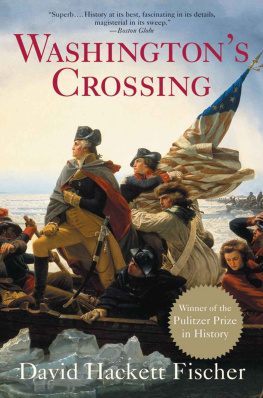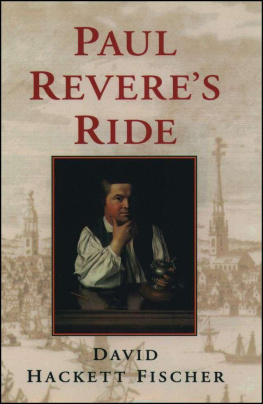
Oxford New York
Auckland Bangkok Buenos Aires Cape Town Chennai Dar es Salaam Delhi Hong Kong Istanbul Karachi Kolkata Kuala Lumpur Madrid Melbourne Mexico City Mumbai Nairobi So Paulo Shanghai Taipei Tokyo Toronto
Copyright 2004 by David Hackett Fischer
First published by Oxford University Press, Inc., 2004 198 Madison Avenue, New York, New York 10016
www.oup.com
Oxford is a registered trademark of Oxford University Press
All rights reserved. No part of this publication may be reproduced, stored in a retrieval system, or transmitted, in any form or by any means, electronic, mechanical, photocopying, recording, or otherwise, without the prior permission of Oxford University Press.
The Library of Congress has cataloged the cloth edition as follows:
Fischer, David Hackett, 1935
Washingtons crossing / David Hackett Fischer.
p. cm. (Pivotal moments in American history)
Includes bibliographical references and index.
ISBN 0-19-517034-21
1. Delaware River Valley (N.Y.Del. and N.J.)HistoryRevolution,17751783.
2. Washington, George, 17321799HeadquartersPennsylvaniaValley Forge.
I. Title. II. Series.
E263.P4 F575 2004 973.332dc22
WASHINGTONS CROSSING
DAVID HACKETT FISCHER


PIVOTAL MOMENTS IN AMERICAN HISTORY
Series Editors
David Hackett Fischer James M. McPherson David Greenberg
Available in print & ebook:

| The Battle of Midway
Craig L. Symonds
There are few moments in American history in which the course of
events tipped so suddenly and so dramatically as at the Battle of
Midway. At dawn of June 4, 1942, a rampaging Japanese navy
ruled the Pacific. By sunset, their vaunted carrier force had been
sunk and their grip on the Pacific had been loosened forever.
Available October, 2011
|

As If an Enemys Country:
The British Occupation of Boston
and the Origins of Revolution
Richard Archer

Crossroads of Freedom: Antietam
James M. McPherson
Adams vs. Jefferson:
The Tumultuous Election of 1800
John Ferling
The Birth of Modern Politics:
Andrew Jackson, John Quincy Adams,
and the Election of 1828
Lynn Hudson Parsons
The Last Indian War:
The Nez Perce Story
Elliott West
The Scratch of a Pen: 1763
and the Transformation
of North America
Colin G. Calloway
The Bay of Pigs
Howard Jones
Storm over Texas:
The Annexation Controversy
and the Road to Civil War
Joel H. Silbey
Seneca Falls and the Origins
of the Womens Rights Movement
Sally McMillen
James Madison and the
Struggle for the Bill of Rights
Richard Labunski
The GI Bill: The New Deal for Veterans
Glenn Altschuler & Stuart Blumin
Rainbows End: The Crash of 1929
Maury Klein
Freedom Riders:
1961 and the Struggle
for Racial Justice
Raymond Arsenault
Brown v. Board of Education:
A Civil Rights Milestone
and Its Troubled Legacy
James T. Patterson
All Shook Up:
How Rock n Roll Changed America
Glenn C. Altschuler
WASHINGTONS CROSSING
For Anne, with love
CONTENTS
MAPS
EDITORS NOTE
This volume is part of a series called Pivotal Moments in American History. Each book in this series examines a large historical event or process that changed the course of American development. These events were not the products of ineluctable forces outside the boundaries of human choice; they were the results of decisions and actions by people who had opportunities to choose and act otherwise. This element of contingency introduces a dynamic tension into the story of the past. Books in the Pivotal Moments series are written in a narrative format to capture that dynamic tension of contingency and choice.
The design of the series also reflects the current state of historical writing, which shows growing attention to the experiences of ordinary people and increasing sensitivity to issues of race, ethnicity, class, and gender in the context of large structures and processes. We seek to combine this new scholarship with old ideas of history as a narrative art and traditional standards of sound scholarship, mature judgment, and good writing.
No single day in history was more decisive for the creation of the United States than Christmas 1776. On that night a ragged army of 2,400 colonials crossed the ice-choked Delaware River from Pennsylvania to New Jersey in the teeth of a noreaster that lashed their boats and bodies with sleet and snow. After marching all night, they attacked and defeated a garrison of 1,500 Hessian soldiers at Trenton. A week later the Americans withstood a fierce British counterattack in Trenton and then stole away overnight to march fifteen miles by back roads to Princeton, where they defeated British reinforcements rushing to Trenton.
These victories saved the American Revolution from collapse. Without them there would have been no United States, at least as we know it. Of all the pivotal events in American history, none was more important than what happened on those nine days from December 25, 1776, through January 3, 1777. During the previous five months the American rebels had lost every battle. They had been driven from Long Island to Westchester and across the Hudson and Delaware Rivers to Pennsylvania. George Washingtons army had lost 90 percent of its strength. Many of the remaining troops intended to go home when their enlistments expired at the end of the year. Citizens in New Jersey and elsewhere were taking the oath of allegiance to the king. The bold declaration of July 4, 1776, seemed all but dead. Washingtons crossing of the Delaware was an apparent act of desperation. But it paid off in a huge way. The battles of Trenton and Princeton heralded the triumph of independence six years later.
The story is full of twists and turns, of contingent moments when events seemed likely to move in one direction but then swung in another, when leaders made key choices between two or more alternatives. The storm on December 2526 delayed the crossing so long that Washington almost called off the whole operation. But the same storm masked the Americans approach to Trenton and curtailed the normal alert patrolling of the Hessians (Fischer disposes of the old canard that the Hessians were sleeping off a Christmas drunk). A hard freeze on the night of January 23 made passable the road taken by the Americans from Trenton to Princeton that had been knee-deep in mud the previous day. Many other contingencies large and small await the reader of this dramatic story.
Next page





















